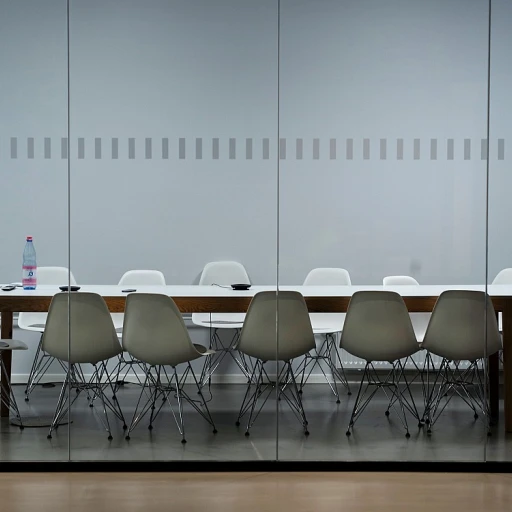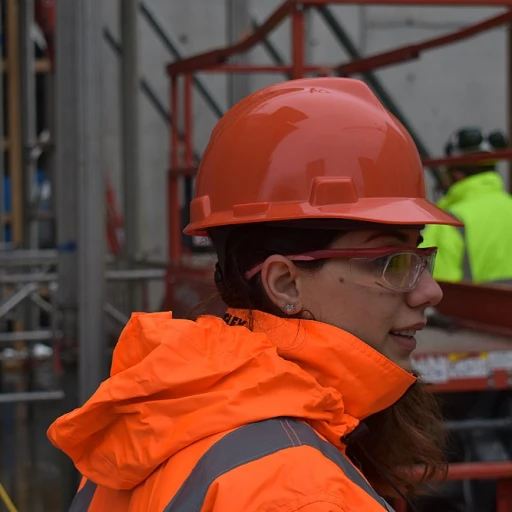Understanding the Importance of Organization in UK Offices
The Role of Organization in Enhancing Office Efficiency
In the realm of UK companies, maintaining a well-organized office might seem like a basic requirement, yet it plays a fundamental role in enhancing efficiency. Organization in an office setting is not just about keeping the desks tidy or filing papers. It is about creating an environment where the team can work seamlessly, leading to better productivity and higher employee satisfaction. Proper organization in an office complements various critical aspects like project management and time management. Through effective organizational skills, office managers can ensure that deadlines are met and tasks are efficiently completed. When an office manager demonstrates the ability to stay organized, they can manage time more effectively, making sure that both short-term projects and long-term goals are on track. Organizational skills are immensely valued in the corporate landscape. According to interview questions often asked in the field, the ability to keep organized is crucial for ensuring that team operations run smoothly. For instance, a common interview question might be, "How do you keep track of multiple tasks and meet deadlines consistently?" A well-rounded answer might involve discussing specific tools or techniques that are used to stay organized. Moreover, keeping the workspace organized affects not just the physical space but also impacts remote work setups. This becomes even more critical in remote jobs, where the absence of a structured office environment necessitates discipline and self-management. Enhancing meeting room harmony with Feng Shui could be an interesting approach that some UK offices are exploring to boost organization and collaboration. By understanding these intrinsic connections, office managers can foster a more harmonious and responsive environment, ultimately leading to a more productive workplace enhancing meeting room harmony.Key Challenges Faced by UK Office Managers
Challenges that Demand Attention
UK office managers consistently encounter certain challenges that can hinder their ability to stay organized. Understanding these challenges is crucial for developing effective organizational strategies. One key challenge is managing various tasks and deadlines efficiently. Balancing multiple projects across different departments requires exceptional time management skills. For example, an office manager must keep track of team schedules, office supplies, and ongoing projects while ensuring that each task is completed promptly. Office managers often face the task of organizing both physical and digital workspace, which can be daunting. With the rise of remote work, it's essential to maintain seamless communication and coordination between on-site and remote team members. This involves using appropriate tools and strategies to manage tasks effectively and ensure team cohesion even if members are working from different locations. In addition to managing time effectively, office managers need to demonstrate their ability to answer various questions that arise in the workplace. These can range from simple organizational questions to more complex inquiries about project management and team dynamics. Being well-prepared with structured responses can significantly enhance their role in maintaining an organized environment. Interview questions for office managers often focus on their organizational skills, ability to stay organized, and methods used to meet deadlines. A strong example answer would highlight their use of tools and techniques to efficiently manage time and resources. Ultimately, the ability to keep organized and stay proactive in addressing these challenges directly affects the overall efficiency of the office environment. By adopting suitable strategies and utilizing effective tools, office managers can navigate these challenges with greater ease. For more detailed insights into enhancing your workspace for better organization, check out this article on expansive desk planners.Effective Tools and Techniques for Staying Organized
Mastering the Use of Organizational Tools
Staying organized in a fast-paced office environment is crucial for meeting deadlines and ensuring smooth operations. Effective tools and techniques are indispensable for office managers in UK companies aiming to stay on top of their tasks and keep the office running efficiently.
Firstly, implementing digital tools can streamline various processes. For example, project management software like Asana or Trello allows office managers to keep track of projects and deadlines comprehensively. These tools not only help in task allocation but also in monitoring the progress of remote teams, making it easier to manage remote jobs.
Furthermore, calendar apps such as Google Calendar or Microsoft Outlook are invaluable for time management. They enable office managers to answer meeting requests promptly, organize their day effectively, and avoid scheduling conflicts. The ability to manage time effectively is an essential part of an office manager's job, and these apps help ensure that crucial tasks are not overlooked.
An interview question often posed to office managers is how they stay organized within a busy office setting. Example answers can highlight the use of these tools and techniques to demonstrate their ability to prioritize tasks and meet deadlines. For instance, highlighting the use of digital task lists and productivity apps can be a strong example of their organizational skills in action.
In addition to digital tools, traditional organizational techniques should not be overlooked. Techniques such as maintaining a clean and orderly desk, using color-coded filing systems, and having regular debrief meetings with the team can greatly enhance an office manager’s ability to stay organized. These methods work hand-in-hand with technology to maintain a cohesive work environment.
Ultimately, the question of how to stay organized in any office comes down to the ability to integrate both modern tools and classical techniques effectively. By mastering these skills, office managers in UK companies can excel in their roles and support their teams in achieving company objectives efficiently.
Time Management Strategies for Office Managers
Strategies for Effective Use of Time
Managing time effectively is crucial for office managers aiming to keep their teams organized and meet deadlines. When it comes to time management, think of yourself as a project manager overseeing multiple tasks and responsibilities. Here are some strategies to consider:- Prioritize Tasks: Not all tasks carry the same level of importance. Identifying which tasks are urgent can greatly improve your ability to stay organized. Using project management tools can help keep track of high-priority tasks efficiently.
- Set Clear Deadlines: Establishing realistic yet firm deadlines is essential. This not only helps you stay on track but also ensures the team has clear understanding of expectations. Tools like shared calendars can be useful for this.
- Break Tasks into Manageable Steps: A common challenge in UK offices is handling complex projects. Breaking these into smaller, manageable steps makes it easier to maintain focus and measure progress.
- Allocate Time Blocks: A practical way of managing time is to allocate specific blocks for tasks, meetings, and breaks. This approach can be particularly beneficial for those in jobs remote settings, allowing individuals to maintain a work-life harmony.
Implementing Organizational Systems in the Workplace
Implementing Structures for Optimal Efficiency
Successful organization in an office environment relies heavily on implementing well-structured systems. An office manager must demonstrate the ability to manage time effectively and stay organized by setting up clear processes. This not only helps in answering key organizational questions but also ensures meeting deadlines consistently. Creating a system where tasks are clearly defined and tracked can greatly support the management of both team and individual workloads. Consider integrating project management tools that facilitate tracking and prioritizing tasks. These tools enable project managers and teams to keep track of project progress and address any bottlenecks in a timely manner. For example, incorporating remote work-friendly technologies can simplify job sharing and task delegation, ensuring all team members, whether working on-site or remotely, have access to crucial information. This demonstrates the ability to stay organized and maintain clear communication channels. Additionally, developing organizational skills through the implementation of a standardized filing system can make retrieving documents more efficient, saving both time and resources. Include a shared digital repository where teams can easily store and access current documents. Encourage team members to enhance their organizational skills by regularly reviewing their processes and making necessary adjustments. This proactiveness not only improves personal job management but also contributes to overall organizational efficiency. The integration of these systems will aid in maintaining a structured environment where interview questions and tasks are addressed promptly and accurately. Thus, enhancing the organization's ability to keep organized and operate smoothly.Measuring the Success of Organizational Strategies
Evaluating Your Organizational Strategies: A Step-by-Step Approach
Effectively measuring the success of organizational strategies is crucial for office managers aiming to keep the office environment efficient and productive. To determine the impact of your initiatives, consider the following steps:- Set Clear Objectives: At the onset of implementing any organizational strategy, define your objectives clearly. For instance, if you're introducing new tools and techniques, outline what you hope to achieve, be it improved time management or enhanced team collaboration.
- Utilize Feedback Mechanisms: Regular feedback from your team is invaluable. Encourage open discussions where team members can answer questions about their experiences with new systems and express their opinions on areas of improvement.
- Monitor Key Performance Indicators (KPIs): Use KPIs to track the effectiveness of your strategies. Metrics such as task completion time, ability to meet deadlines, and team satisfaction levels can provide insights into how well your organization maintains its objectives.
- Conduct Regular Reviews: Set up periodic reviews to evaluate progress. Ask yourself questions like, "Do the implemented strategies enable the team to stay organized?" or "Is there a noticeable improvement in our project management outcomes?"
- Adapt and Refine: Based on the data collected and feedback received, be open to modifying your approaches. For example, if a particular tool is not enhancing productivity as expected, consider exploring alternative solutions that better serve your job requirements.
- Demonstrate Ability to Adapt: Show your team that you can adapt to new challenges by altering strategies when necessary. This demonstrates the project's overall ability to stay on course and deliver timely results.












